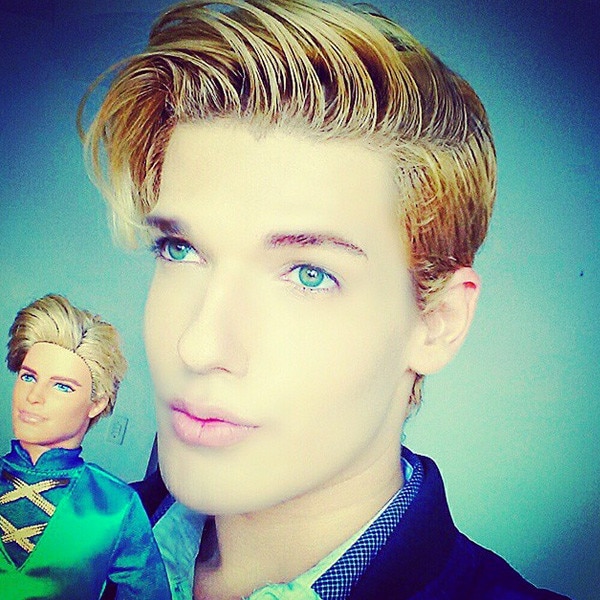
The term "Human Ken Doll" has become synonymous with extreme transformation and the pursuit of an idealized image. This title is most famously associated with Rodrigo Alves, a Brazilian model who has undergone numerous surgeries to achieve a doll-like appearance. His journey is not just about physical transformation; it delves into the complexities of identity, acceptance, and the societal pressures that drive individuals to alter their bodies. In a world where beauty standards are constantly evolving, the Human Ken Doll stands as a provocative figure, challenging our perceptions of self-worth and the lengths people go to for acceptance.
Rodrigo's transformation began at a young age, fueled by a desire to look like the dolls he admired. As he navigated through life, the desire morphed into a series of surgeries that would redefine his appearance and, ultimately, his identity. The Human Ken Doll phenomenon raises essential questions about the nature of beauty, the impact of social media, and the mental health implications tied to body image. As we explore the life of Rodrigo Alves, we uncover the layers of his experience and the motivations behind his drastic changes.
In this article, we will delve deeper into Rodrigo's background, his journey to becoming the Human Ken Doll, and the societal implications of his choices. We will examine what it means to transform one's body in the quest for beauty and how this quest resonates with broader cultural narratives. Through analysis and insight, we aim to provide a comprehensive understanding of the Human Ken Doll phenomenon and its relevance in today's society.
Who is the Human Ken Doll?
The Human Ken Doll is none other than Rodrigo Alves, a Brazilian-born individual who has gained global recognition for his extreme transformation. Born on July 30, 1983, in São Paulo, Brazil, Rodrigo's fascination with dolls began in his childhood. He grew up idolizing the aesthetics of Ken dolls, which inspired his quest for a perfect, doll-like appearance.
What Are the Key Biographical Details of Rodrigo Alves?
| Detail | Information |
|---|---|
| Name | Rodrigo Alves |
| Date of Birth | July 30, 1983 |
| Place of Birth | São Paulo, Brazil |
| Occupation | Model, TV Personality |
| Notable Achievements | World's Most Modified Man, Human Ken Doll |
How Did Rodrigo Alves Become the Human Ken Doll?
Rodrigo's transformation began at the tender age of 17 when he had his first cosmetic surgery. Over the years, he has undergone more than 100 procedures, including rhinoplasty, lip fillers, and chin implants. The surgeries have not only altered his appearance but also sparked discussions about the ethics of cosmetic surgery and the societal pressures that influence such decisions.
What Motivates the Human Ken Doll's Transformation?
For Rodrigo, the motivation behind his transformations runs deep. He has openly discussed feelings of inadequacy and the desire to fit into an idealized beauty standard. In interviews, he has stated that his surgeries were not just about looking like a doll but also about boosting his self-esteem and confidence. The Human Ken Doll's journey prompts a broader conversation about the societal perceptions of beauty and the mental health implications that can arise from them.
How Does Society View the Human Ken Doll Phenomenon?
The Human Ken Doll has received mixed reactions from the public. While some admire Rodrigo for his boldness and self-expression, others criticize him for promoting unrealistic beauty standards. The phenomenon has sparked debates about body image, self-acceptance, and the impact of social media on beauty ideals. In a world dominated by filters and edited images, the question arises: Are we losing touch with reality?
What Are the Consequences of Extreme Transformation?
Rodrigo's journey raises critical questions about the consequences of extreme transformations. While some may view it as a form of self-expression, others argue that it can lead to dangerous behaviors and mental health issues. The pursuit of an unattainable ideal can result in body dysmorphic disorder, anxiety, and depression, which are prevalent among individuals seeking cosmetic enhancements.
Can the Human Ken Doll Inspire Change in Society?
Despite the controversies surrounding his transformation, Rodrigo Alves has the potential to inspire change in how society views beauty and self-acceptance. By sharing his story, he encourages conversations about diversity in beauty standards and the importance of embracing one's individuality. The Human Ken Doll phenomenon serves as a reminder that beauty is subjective and that self-love and acceptance should be prioritized over societal pressures.
What Can We Learn from the Human Ken Doll's Journey?
Rodrigo Alves' journey as the Human Ken Doll teaches us valuable lessons about self-identity and the complexities of beauty. It highlights the need for empathy and understanding towards those who choose to alter their bodies and the importance of mental health awareness in the context of body image. By fostering a culture that values authenticity over perfection, we can begin to redefine beauty standards and promote self-acceptance.
What Lies Ahead for the Human Ken Doll?
As Rodrigo Alves continues to navigate his life as the Human Ken Doll, his journey serves as a reflection of the evolving nature of beauty and identity. The future holds endless possibilities for him, whether through continued advocacy for self-acceptance or further exploration of his own identity. The Human Ken Doll phenomenon remains a captivating subject, challenging us to reconsider our perceptions of beauty and the impact of societal expectations on our sense of self.
ncG1vNJzZmivp6x7p7XGoaugqpGlva2x05qnZ5ufonyjvsScoqWdYmS1trnAp2SknZ5isbC4y2efraWc